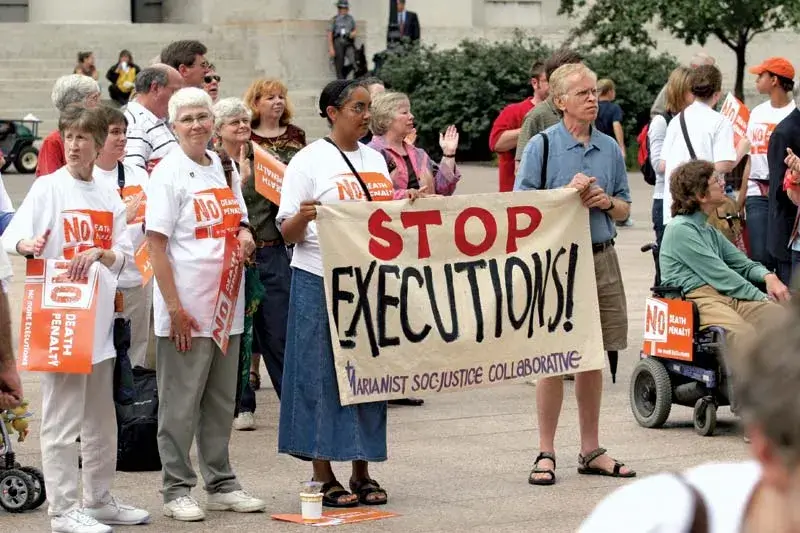The death penalty, also known as capital punishment, is a legal practice in which a state-sanctioned execution is carried out as a form of punishment for certain crimes, usually involving murder or treason. The methods of execution have varied over time and across different jurisdictions, with methods such as hanging, firing squad, electrocution, gas chamber, and lethal injection used. Currently, the death penalty is still enforced in some countries, while others have abolished it, either in law or in practice.
Capital punishment remains a highly controversial and divisive topic, with strong opinions on both sides of the debate. Proponents argue that the death penalty serves as a deterrent to crime, provides justice for the victims and their families, and is a fitting punishment for heinous crimes. Opponents, on the other hand, raise concerns about the morality and ethics of taking a human life, the potential for executing innocent individuals, the discriminatory nature of its application, and the high costs associated with the legal process.
Given the severity and irrevocability of the death penalty, it is crucial to consider and understand the opposing viewpoints in order to engage in a fair and informed debate. Acknowledging the concerns and arguments of both sides can lead to a more nuanced understanding of the issue and contribute to the development of more effective and just criminal justice policies.
Moral and Ethical Arguments Against the Death Penalty
The sanctity of human life
Many religious groups and leaders oppose the death penalty, citing the sanctity of human life as a fundamental principle. In Christianity, for example, the belief in forgiveness and mercy often conflicts with the idea of taking a life as punishment. Similarly, in Buddhism, the principle of non-harming (ahimsa) discourages the use of capital punishment. While some religious texts may support capital punishment in certain cases, modern interpretations often emphasize the value of human life and the need for compassion and rehabilitation.
From a philosophical standpoint, the sanctity of human life is often invoked as an argument against the death penalty. Utilitarianism, for instance, focuses on maximizing overall happiness and minimizing suffering, which may not align with the practice of capital punishment. Additionally, the Kantian perspective that humans should never be treated as mere means to an end suggests that taking a life as retribution is morally unjust.
The execution of innocent people
The risk of wrongful convictions is a major concern for opponents of the death penalty. Factors such as human error, false confessions, unreliable eyewitness testimony, and prosecutorial misconduct can contribute to innocent individuals receiving a sentence of death. The irreversible nature of the death penalty means that there is no recourse for correcting these miscarriages of justice once an execution has taken place.

Technological advancements, such as the use of DNA evidence, have played a significant role in exonerating wrongfully convicted individuals. In some cases, these exoneration’s have occurred after a person has spent years on death row, highlighting the potential for the execution of innocent people. The presence of such advancements calls for a re-evaluation of the death penalty and its potential consequences.
Discrimination and social injustice
Studies have shown that racial bias plays a significant role in the application of the death penalty. In the United States, for example, defendants of color, particularly African Americans, are more likely to receive a sentence of death than white defendants for similar crimes. Moreover, cases involving white victims often result in a higher likelihood of a death sentence than those involving victims of color.
The death penalty has also been criticized for disproportionately affecting individuals from lower socioeconomic backgrounds. The quality of legal representation can significantly impact the outcome of a case, with those unable to afford skilled attorneys being more likely to receive a death sentence. This raises concerns about the fairness and equality of the criminal justice system, as well as the potential for capital punishment to perpetuate social injustices.
Legal and Procedural Issues
Constitutional concerns
The Eighth Amendment to the United States Constitution prohibits the infliction of cruel and unusual punishment. Opponents of the death penalty argue that capital punishment violates this constitutional protection, particularly due to the potential for painful and botched executions. Additionally, there has been challenges to some methods of execution as cruel and unusual, leading to changes in execution methods over time.
The Fourteenth Amendment guarantees due process and equal protection under the law. Critics argue that the death penalty, as applied, often fails to satisfy these constitutional requirements due to systemic biases and inconsistencies in its application. They contend that the unequal treatment of defendants based on race, socioeconomic status, or geographic location undermines the fundamental principles of fairness and justice.
Inconsistency in the application of the death penalty
The use of the death penalty varies significantly across different jurisdictions, leading to concerns about its arbitrary application. In some regions, the pursuit of capital punishment is more aggressive, while in others, it is rarely or never sought. These disparities suggest that the decision to impose the death penalty may depend more on local customs and the views of individual prosecutors than on the severity or nature of the crime itself.
The considerable discretion afforded to prosecutors and judges in death penalty cases can lead to inconsistencies and potential bias in its application. Factors such as public opinion, political pressure, and personal beliefs can influence a prosecutor’s decision to seek the death penalty or a judge’s decision to impose it. This discretion raises concerns about the fairness and objectivity of the process.
Lengthy and costly appeals process
The appeals process for death penalty cases is often lengthy and costly, placing a significant financial burden on taxpayers. Studies have shown that capital cases can cost several times more than non-capital cases due to increased legal fees, expert witnesses, and other expenses. These costs have led some to question whether the resources spent on death penalty cases could be better allocated to other areas, such as crime prevention or victim support services.
The protracted appeals process can also take an emotional toll on the families of victims and the accused. For victims’ families, the constant delays and uncertainty can prolong their grief and impede their ability to find closure. For the accused and their families, the extended time spent on death row can exacerbate feelings of fear, anxiety, and hopelessness.
Alternatives to the Death Penalty
Life imprisonment without parole
Life imprisonment without the possibility of parole offers a severe and just punishment for those who commit heinous crimes while avoiding the ethical and procedural concerns associated with the death penalty. By ensuring that the offender remains incarcerated for the rest of their life, society becomes protected from any potential threat posed by the individual while still upholding the sanctity of human life.
Life imprisonment without parole provides an alternative that allows for the possibility of exoneration in cases of wrongful convictions. Unlike the death penalty, life imprisonment allows for the correction of judicial errors, providing a safeguard against the irreversible consequence of executing an innocent person.

Restorative justice
Restorative justice is an alternative approach to criminal justice that focuses on repairing the harm caused by crime and promoting healing for all parties involved, including victims, offenders, and the community. This approach often involves facilitated dialogues, apologies, and restitution, which can help victims find closure and give offenders an opportunity to take responsibility for their actions and make amends.
Restorative justice seeks to address the underlying factors that contribute to criminal behavior, such as social, economic, and psychological issues. By fostering a greater understanding of these root causes and promoting community-based solutions, restorative justice aims to prevent future criminal activity and create safer, more cohesive communities. This approach offers a more holistic and compassionate alternative to the retributive nature of the death penalty, emphasizing rehabilitation and social reintegration over punishment and isolation.
International Perspectives
Global trends toward abolishment
The global trend towards the abolishment of the death penalty has evolved, in part, by comparisons to other developed nations. Many industrialized countries have abolished capital punishment, either in law or in practice, viewing it as an outdated and inhumane form of punishment. This shift has led to increased scrutiny of countries that continue to enforce the death penalty, with some questioning their commitment to human rights and progressive criminal justice policies.
The abolishment of the death penalty is also influenced by international human rights standards. Organizations such as the United Nations and the European Union have called for a worldwide moratorium on capital punishment, citing concerns about the sanctity of human life, the potential for wrongful convictions, and the discriminatory application of the death penalty. The growing consensus among international human rights bodies has put pressure on countries to reconsider their stance on capital punishment.
Diplomatic implications
The enforcement of the death penalty can create diplomatic challenges when it comes to extradition. Some countries that have abolished capital punishment may refuse to extradite criminal suspects to countries where they may face the death penalty, citing concerns about human rights violations. This reluctance to extradite can strain diplomatic relations and hinder international cooperation on criminal justice matters.
The stance of a country on the death penalty can impact its perceived commitment to human rights and its ability to influence global human rights policies. Countries that enforce capital punishment may face criticism and reduced credibility in international forums, limiting their ability to shape human rights norms and standards. Conversely, countries that abolish the death penalty may come across as leaders in promoting human rights and may have a greater influence on the global human rights agenda.
Conclusion
The death penalty remains a contentious issue with strong arguments on both sides. Opponents raise concerns about the sanctity of human life from religious and philosophical perspectives, the risk of executing innocent people due to wrongful convictions, discrimination and social injustice, constitutional concerns, inconsistencies in the application of the death penalty, and the lengthy and costly appeals process. They also highlight alternatives to the death penalty, such as life imprisonment without parole and restorative justice, which offer more humane and equitable approaches to addressing crime and its consequences.
Engaging in open and informed debate about the death penalty is essential for understanding the complex moral, ethical, legal, and procedural issues surrounding capital punishment. Considering opposing viewpoints and acknowledging the concerns and arguments of both sides can lead to a more nuanced understanding of the issue and contribute to the development of more effective and just criminal justice policies.
The future of the death penalty, both in the United States and globally, is uncertain. As public opinion continues to evolve, and international pressure mounts to abolish capital punishment, more countries may reconsider their stance on the issue. In the United States, the ongoing debate over the death penalty will likely be shaped by factors such as public sentiment, high-profile cases, legal developments, and the growing trend towards alternatives like life imprisonment without parole and restorative justice.
Ultimately, the future of the death penalty will depend on the collective decision-making of societies, informed by an ongoing examination of its merits, drawbacks, and alternatives.






